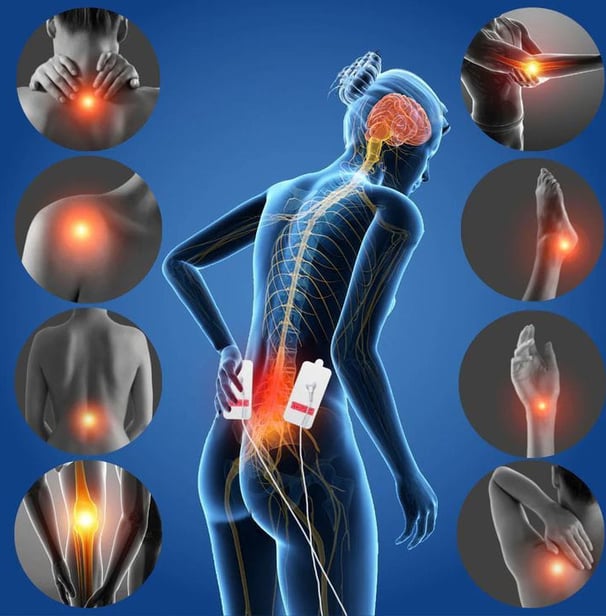Herniated Disc: Symptoms You Need to Know
Learn about common symptoms of a herniated disc, from back pain to numbness. Discover how to manage and treat a herniated disc with the right approach. Read the full article now!
BODY HEALTHHERNIATED DISCHERNIATED DISC SYMPTOMS
11/13/20243 min read


A herniated disc occurs when the inner part of a spinal disc (nucleus pulposus) pushes out through the tougher outer layer (annulus fibrosus) and can press on nearby spinal nerves. This condition can cause various symptoms, depending on the location and severity of the herniation. Here are common symptoms of a herniated disc:
Back Pain
Back pain is often the first symptom experienced by those with a herniated disc, especially if the herniation occurs in the lumbar region (lower back). A slipped or compressed disc can press on surrounding spinal nerves, resulting in sharp, dull, or stabbing pain. This pain can become chronic, worsen with physical activity, and feel more intense when bending or lifting. In cases of herniation in the neck (cervical) area, pain may be felt in the neck and extend to the shoulders or upper back.
Pain Radiating to Arms or Legs
Radiating pain is a characteristic symptom of a herniated disc, depending on its location. If it occurs in the lumbar region, compressed sciatic nerves can cause sciatica, with pain radiating to the thigh, calf, and even foot. This pain is often accompanied by a burning or electric-like sensation. In cervical herniation, pain may radiate to the arm, hand, and fingers. This symptom often impacts the quality of life as it makes it challenging for patients to move or perform normal activities.
Muscle Weakness
Pressure from a herniated disc on the spinal nerves can disrupt nerve signals that control muscles, resulting in weakened muscles. In lumbar disc herniation, muscle weakness often occurs in the legs, affecting the ability to walk or climb stairs. In neck herniation, weakness may occur in the arm and hand muscles, making it difficult to lift objects or grip firmly.
Numbness or Tingling
When nerves are compressed by the protruding nucleus pulposus, this can disrupt normal nerve signaling, leading to numbness or tingling sensations. This can feel like "numbness" in certain body parts, depending on the location of the herniation. In lumbar herniation, numbness often affects the thigh, calf, or foot, while in cervical herniation, the numb sensation may be felt in the arms or fingers. This symptom causes a reduced sense of sensitivity or a loss of normal feeling in the affected area.
Loss of Reflexes
Reflexes are the body's automatic response to stimuli, and when nerves controlling these reflexes are compressed or pinched by a herniated disc, the reflexes may weaken or disappear. In herniated disc cases, diminished reflexes are often observed in the knees or ankles, reducing the body's ability to respond to environmental changes or threats. Loss of reflexes also contributes to balance and coordination issues, increasing the risk of injury or falls.
Difficulty Controlling Urination or Bowel Movements
One of the most serious symptoms of a herniated disc is cauda equina syndrome, which occurs when the herniation compresses the nerves controlling bladder and bowel function. This can lead to difficulties in controlling urination or bowel movements and even incontinence. This condition requires immediate medical attention as it can cause permanent nerve and organ damage.
Stiffness or Rigidity
Herniated disc sufferers often experience muscle stiffness around the affected spine area. This stiffness occurs because the muscles around the spine attempt to stabilize the injured or compressed area, even though this results in increased body rigidity and reduced flexibility. Patients may find it difficult to move or bend, especially after sitting for a long time or upon waking. Stiffness often worsens with movements requiring flexibility or during actions like coughing and sneezing.
Pain That Worsens with Certain Activities
Pain that worsens with specific activities is a characteristic symptom of a herniated disc, resulting from increased pressure on the spine. Actions like coughing, sneezing, bending, or running can exacerbate the pain due to the added pressure on the herniated disc. These movements can worsen pain and tension in the pinched nerves, aggravating the condition. Therefore, herniated disc sufferers often feel better when they rest or avoid heavy activities.
FAQs About Herniated Dis
What causes a herniated disc?
Herniated discs are usually caused by spinal injuries, aging, or excessive pressure on spinal discs due to improper activities, such as bending or lifting heavy objects.
How can a herniated disc be treated without surgery?
Non-surgical treatment includes physical therapy to strengthen muscles, pain relievers, and corticosteroid injections to reduce inflammation. If symptoms do not improve, surgery may be necessary.
When should I seek medical help for a herniated disc?
If you experience severe pain, difficulty moving, or symptoms such as loss of bladder or bowel control, consult a doctor promptly for further diagnosis and treatment.
Herniated disc symptoms vary widely, from localized pain in the back or neck to more severe symptoms like difficulty controlling urination or bowel movements. If you experience these symptoms, especially if they significantly interfere with daily activities, it is highly recommended to consult a doctor or spine specialist for proper diagnosis and treatment, as well as effective management to prevent further nerve damage and restore your quality of life.
Illustration of Symptoms that irritate other parts of a Herniated Disc
